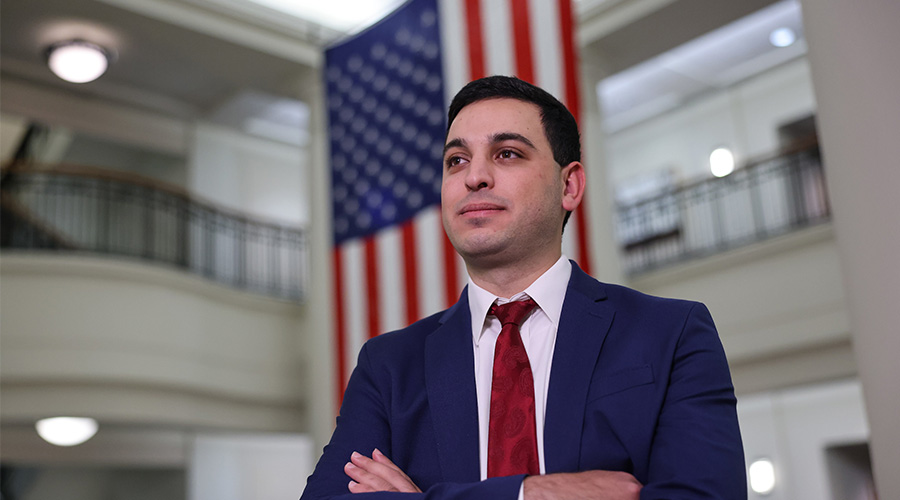'A Cure for Cynicism'

Omar Hajajra was named one of National Jurist magazine’s “2025 Law Students of the Year” for his international human rights work—one of just five students recognized nationwide for their advocacy and service.
In a concrete-block refugee camp near Bethlehem, Omar Hajajra grew up in precarious legal limbo—recognized as a citizen of no country, neither Jordan, Israel, nor Palestine. This statelessness meant he lacked some rights many take for granted: no passport, limited freedom of movement, few legal protections.
At the time, he was a third-generation refugee. His grandparents had lived for years in a tent encampment, and his father worked as a janitor for the United Nations. The family, a dozen people in all, shared a small, no-frills apartment, living on food rations during Hajajra’s earliest years.
Today, he stands as one of National Jurist magazine’s “2025 Law Students of the Year,” one of just five students recognized nationwide for exceptional advocacy and service.
At 16, Hajajra’s life took a major turn when he won the Kennedy-Lugar Youth Exchange and Study Scholarship from the US State Department. His host family in Hanover, New Hampshire, supported his continued stay in America, and he eventually became a US citizen, earning his undergrad degree in history and political science at Colby-Sawyer College and then setting his sights on law school.
Attending Suffolk Law “has been transformative,” says Hajajra. “The professors challenged me and guided me. Everything I have experienced here has strengthened my commitment to helping vulnerable people whose struggles mirror those I once faced myself.”
Whether in the classroom or through global legal work, he has, he adds, learned “the importance of listening to perspectives different from my own and engaging thoughtfully with complex, often uncomfortable issues—something my background and training in law and history have helped me approach with empathy and critical thinking.”
As executive director of Suffolk Law’s Ukraine Accountability Project, Hajajra led a team documenting Russian war crimes. The group’s meticulously researched white papers have reached the highest levels of international governance, typically including G7 leaders and State Department officials.
Last summer, the Law School facilitated Hajajra’s externship at the European Court of Human Rights in Strasbourg, France—the continent’s premier human rights tribunal. There, he had the unique opportunity to clerk for Judge Saadet Yüksel and helped organize a major conference bringing together top judges from 46 Council of Europe member states. The previous summer, Hajajra interned at the Raoul Wallenberg Institute in Lund, Sweden, working on human rights issues.
Before law school, as an intern for US Senator Jeanne Shaheen on the Senate Foreign Relations Committee, he conducted research for the Elie Wiesel Genocide and Atrocities Prevention Act, which later became law. During that position, he participated in meetings with Defense Secretary James Mattis and Secretary of State Rex Tillerson.
Hajajra’s journey from a refugee camp to leading international human rights initiatives demonstrates “both his extraordinary resilience and his commitment to justice,” reflects Professor Sara Dillon, faculty advisor for the Ukraine project and co-director of the Law School’s International Law Concentration. “Omar has navigated that path with a combination of drive and humility.
“He is a cure for cynicism,” she says. “Most people look away from the hardest problems, but he just refuses to do that. He won’t give up.”



